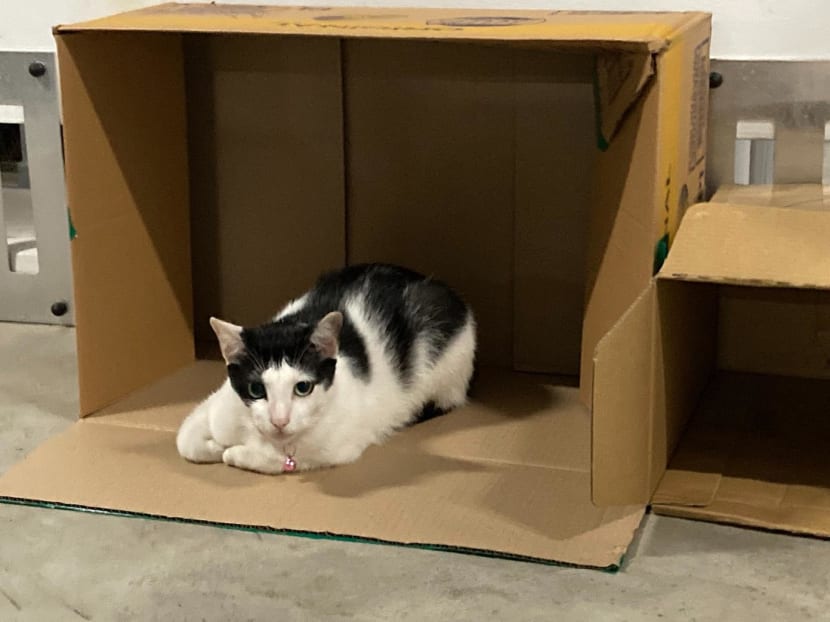HDB gets over 1,500 cat-related complaints a year; cat lovers back plans to manage cat population, house felines in flats
SINGAPORE — In the past two years, the Housing and Development Board (HDB) has received around 1,500 to 1,900 cat-related complaints each year, mostly related to irresponsible pet ownership and disamenities such as cats defecating in common areas.

A cat resting in a cardboard box at a public car park in Toa Payoh estate.
- HDB said it received roughly 1,900 cat-related complaints in 2020, 1,500 in 2021 and 600 in the first half of 2022
- Most of these cases were resolved when owners rehomed their cats, though HDB has taken action twice in the same time period
- The Animal & Veterinary Service (AVS) is planning to improve the management and welfare of cats and to hold errant pet owners accountable
- It is now seeking the public's feedback on its proposals until March 2023
- Cat-lovers, welfare groups and the Singapore Veterinary Association said that the plans will benefit the cat population and encourage more responsible cat ownership
SINGAPORE — In the past two years, the Housing and Development Board (HDB) has received around 1,500 to 1,900 cat-related complaints each year, mostly related to irresponsible pet ownership and disamenities such as cats defecating in common areas.
Faced with such complaints, some cat owners feel that the behaviour of "irresponsible" cat owners have tainted everyone. They are hoping that proposed plans by the Animal & Veterinary Service (AVS) will hold errant pet owners accountable and help to keep the peace among neighbours.
AVS' proposed framework, which it issued on Sept 3, aims to improve the management and welfare of cats, and it may require pet owners to get a license and microchip their cats, among other strategies.
It may also possibly allow cat ownership in HDB flats.
Since 1989, cats have been banned from being kept as pets in HDB flats. Anyone found to have a pet cat in his or her HDB flat may be fined up to S$4,000 under the Housing and Development (Animals) Rules.
AVS is conducting a public feedback exercise for its proposed initiatives from now to March next year. A two-month online survey for the public is available on its website until Nov 2.
Cat lovers and animal welfare advocates told TODAY they are hopeful that these strategies, if implemented, would penalise negligent cat owners while allowing responsible cat owners to house their pets in their HDB homes.
In response to queries from TODAY, HDB said that it received roughly 1,900 cat-related complaints in 2020, 1,500 in 2021 and 600 in the first half of this year. It does not have numbers for other years.
Most cases were resolved after flat owners rehomed their cats, it said. However, it had to take action against two households since 2020 because “the flat owners had repeatedly refused to cooperate and rehome the cats”.
“In setting the rules on pet ownership, HDB’s principal consideration is to preserve a pleasant and harmonious living environment in HDB estates, as well as maintain good neighbourly relations.
“To this end, we strive to balance the interests of residents who are pet lovers and those who may be affected by disamenities as a result of irresponsible pet ownership.”
It added that AVS’ proposed cat management framework will “help mitigate potential concerns about disamenities in the community” because cats can then be traced and cat owners can be held accountable for their pets.
HOPE TO FINALLY KEEP CATS LEGALLY
Speaking to TODAY about AVS’ plans, Mr Henry Goi could not contain his excitement when thinking of the possibility that he may be allowed legally in future to keep two cats that he had rescued.
The 59-year-old financial service director said: “We should not penalise all cat owners, but identify irresponsible owners and hold them accountable for their cats being a nuisance.”
His windows and doors are meshed, and his cats are kept indoors. Both of Mr Goi's cats, aged 15 and one, are not microchipped since it is not required, but he said that he would if it is made mandatory.
“I didn’t do it as I keep my cats indoors, and they can’t run out so it's safe,” he explained.
Undergraduate Razza Farwyzah, 21, is happy that the ongoing public consultation may result in concrete actions to improve cat welfare in Singapore, but she wondered if AVS would release more details.
“What are the protocols for allowing cats to live in HDB homes? Do we need to put up meshes at home or are cats going to be allowed to freely roam?” she asked.
Ms Dion Kow, who lives in an HDB flat, is scared of cats, but the 25-year-old whose work is in property management welcomed AVS’ plans as long as cat owners are responsible and considerate.
“I’ve always wondered why cats aren’t allowed when they aren’t as noisy as dogs. As long as owners don’t let them roam around freely and scare people who have a phobia of cats like me, I think this is a good move.”
HELP CONTROL CAT POPULATION
Animal welfare groups told TODAY that the proposed strategies are a “step in the right direction” and these would help them better control the cat population while deterring negligent cat owners from abandoning their cats.
“We’ve seen plenty of abandonment cases this year. Just in the past two weeks, we’ve had more than five pregnant cats in need of help… We’re always running at full capacity.Cat welfare group Project Luni”
Cat welfare group Project Luni said: “This is exciting because while (AVS) has held work groups and conversations, but we haven’t felt so strongly that there will be action taken like this time.
“We’ve seen plenty of abandonment cases this year. Just in the past two weeks, we’ve had more than five pregnant cats in need of help… We’re always running at full capacity and it's sad when we have to decline (taking in another rescued) cat.”
Project Luni relies on 30 volunteer “fosterers” to care for their cats before they are adopted. They can care for 73 cats at a time, but they still reject five cats a day because of a lack of space.
The Society for the Prevention of Cruelty to Animals (SPCA) is often at full capacity as well, its executive director Aarthi Sankar said.
Both SPCA and Project Luni therefore support extending the trap-neuter-rehome or release-manage (TNRM) programme to cats to better manage the cat population.
The TNRM programme is managed by AVS. Since its launch in 2018, it has been focused on managing Singapore’s stray dog population by trapping, neutering and rehoming the animals. Dogs that cannot be rehomed are released in a "suitable locations to live out their lives naturally", AVS stated on its website.
To do so, the agency partners with animal welfare groups and veterinarians. Part of the programme also focuses on educating the general public on handling stray dog encounters so that humans and stray dogs can co-exist peacefully.
Ms Aarthi said: “SPCA has partnered with the relevant authorities to help trap and neuter community dogs… you can visually tell that the number of community dogs in the streets has reduced.
“We’ve learnt a lot from the existing programme already that can help guide us in implementing it for our community cats.”
For cat-owner and community feeder Herbin Chia, neutering and rehoming cats has made a difference in his estate. The 51-year-old, who did not want to make public where he lives, hopes that the authorities’ involvement will make TNRM programmes more efficient island-wide.
Alongside some neighbours across five HDB blocks in Mr Chia’s estate, their informal community group caring for cats has neutered, rehomed and, in some cases, released community cats back in their estate after they are neutered.
“When we first started in 2001 to 2004, there were almost 25 community cats in the area. Now, there are just five because we determined that these five cats are happier outdoors, while the rest are rehomed,” Mr Chia said.
He added that these efforts must be matched with increasing responsible cat-ownership. He noticed that cats have been abandoned in his estate when the owners determined that the community feeders would take care of the cats.
“Too many pet cats get thrown out regularly and they’re often not neutered, causing extra strain on feeders to provide food and care with their own money. They also disturb the existing stray cat population due to cat fights and territorial disputes.Ms Jasmine Chan, 27, a data analyst”
Ms Jasmine Chan, 27, a data analyst, said that abandoned cats can disturb existing community cats and strain community feeders.
“Too many pet cats get thrown out regularly and they’re often not neutered, causing extra strain on feeders to provide food and care with their own money. They also disturb the existing stray cat population due to cat fights and territorial disputes.”
University student Amanda Seah, 24, is hoping that there will be more clarity on the TNRM programme, seeing that some people have voluntarily become carers for community cats on their own. Their efforts could overlap or unintentionally disrupt each other, she said.
Project Luni also said that it wanted more clarity on trapping requirements when there are emergency cases. “We can’t be waiting a few days for approval to trap a cat when it is in immediate danger,” it said.
For example, a cat may need to be trapped quickly if heavily pregnant, or it may have injuries that require immediate attention.
CONCERN OVER 'HIGH-RISE SYNDROME'
In response to queries from TODAY, Dr Teo Boon Han, honorary secretary of the Singapore Veterinary Association, said that the association is strongly supportive of AVS’ strategies.
“We hope that the policies and operational methods that come out of the public consultation are guided by science in an evidence-based manner, in accordance with internationally accepted standards.”
Dr Teo is also a veterinary consultant at VetTrust Singapore, a veterinary, agriculture and pet consultancy firm.
“Pet owners living in high-rise flats should be educated on the need to protect their pet cats by providing a safe and secure environment, such as by meshing their windows, to prevent high-rise syndrome cases.Dr Teo Boon Han, honorary secretary of the Singapore Veterinary Association”
One area that the Singapore Veterinary Association is highly concerned about is the prevalence of cats falling from heights, also known as high-rise syndrome, should cats be kept in HDB flats legally.
Dr Teo did not have specific numbers, but said that some veterinary clinics see such cases on a daily basis, which suggests its prevalence.
Ms Aarthi from SPCA said that it receives about five cases of high-rise syndromes in a week — though this number is representative of just cats that survived to receive treatment.
Dr Teo said: “Pet owners living in high-rise flats should be educated on the need to protect their pet cats by providing a safe and secure environment, such as by meshing their windows, to prevent high-rise syndrome cases.”
He added that vets would play a crucial role in these initiatives, such as by neutering and microchipping cats.
“The veterinary profession also has a key role to play in education and outreach, and to review the policies and proposed processes to ensure that they are feasible and done in an evidence-based manner.”
These professionals should also help in education and outreach programmes, and these programmes should also reach out to the general public to promote tolerance and empathy towards animals and nature, he added.
However, Dr Teo noted the veterinary profession’s manpower crunch and this would be a strain if the TNRM programme is implemented, because they might not have the resources and time to neuter a sudden influx of community cats sent to them.
“The Singapore Veterinary Association will continue to engage the veterinary profession and various stakeholders, and provide our inputs to the AVS,” Dr Teo said.
To take part in the public consultation exercise, head to AVS' website.











